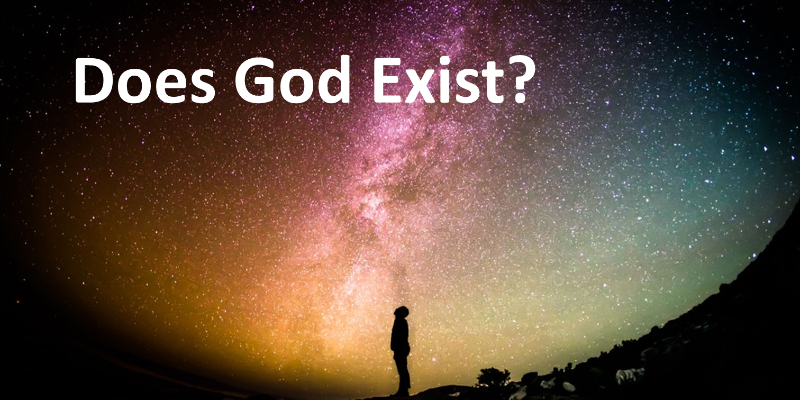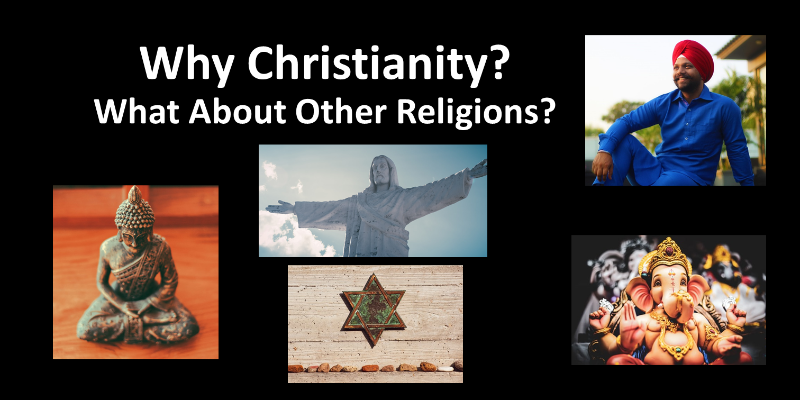The Big Questions
These are some of the questions we get asked the most. They're important questions that most people ask and should ask at some point in their lives.
Something that's really worth considering before looking at these questions, is that any statement that we or anyone makes about anything is either a matter of fact or a matter of opinion. If someone says that apples grow on trees, then this is a matter of fact. If someone says that apples taste nice, then this is a matter of opinion. These questions and the answers to them all pertain to matters of fact. For example, when looking at whether God exists, whatever you believe, he either exists or he does not. He cannot both exist and not exist, depending on your point of view. This is really important, as it's a popular notion that it doesn't matter what you believe. If Christians are wrong, then it doesn't matter, but if we're right, this has huge implications for people's eternal destiny, so it's incredibly important to consider carefully before reaching a conclusion.
 Does God Exist?
Does God Exist?
One of the most common objections to the existence of God is the idea that creation came about as a result of "The Big Bang." This idea suggests that the universe just happened by chance and all of creation came together from nothing.
Stop and think for a moment about everything that's needed for life to exist on this planet - Atmosphere, gravity, temperature, the distance of the Earth from the sun, the speed of the Earth's rotation, the provision of water and food sources, the creation of life itself and the ability for it to procreate. The odds of all these parameters being sufficient to sustain life are one in ten with a hundred and sixty six noughts after! Would you bet your life on those odds?
Think too about the complex nature of everything that exists, whether living or not. Many people find it hard, if not impossible to think that these things were created. Is it not more unbelievable to think that they weren't and that they came about by complete chance? Humans create - art, architecture, literature, landscapes and technology for example. We understand what it is to create something. When you think about animals, flowers, mountains and stars, doesn't it at least seem plausible that they too were created by someone? If so, that someone would have to be a more superior being than mankind. Christians call this superior being "God".
"I am the Lord God. I created the heavens like an open tent above. I made the earth and everything that grows on it. I am the source of life for all who live on this earth, so listen to what I say." - Isaiah 42:5 (CEV)
 Why Does God Allow Suffering?
Why Does God Allow Suffering?
Imagine for a minute that you are God. What will you do to stop suffering? As most suffering comes as a result of the actions of people, you'd have to take control of people's minds, manipulate their behaviour and restrict their personal choices. However well meaning that might seem, imagine what life would be like if that were the case. If we were to live our lives without the ability to make our own choices (and mistakes), then we would have no personal freedom and be like robots. That would be no life at all - certainly not the fullness of life that God created us to enjoy.
"The thief comes only to steal and kill and destroy; I have come that they may have life, and have it to the full." - John 10:10 (NIV)
God wants us to make good choices. His Word through the Bible makes it clear that we are to love our neighbour and do good, but he gives us the freedom to choose for ourselves. These freedoms though come at a price. With personal freedom comes poor choices and inevitably, that will often lead to suffering.
This though is not the end of the story. Despite living in a fallen world with pain and suffering, read on to see how God has made a plan to overcome suffering and even death!
“I have told you these things, so that in me you may have peace. In this world you will have trouble. But take heart! I have overcome the world.” - John 16:33 (NIV)
 What Is A Christian?
What Is A Christian?
Many people would say they are a Christian. If you ask people what makes someone a Christian, you'd get a wide range of different answers. Some might say it's because they believe in God. Others might say it's because they go to church, were born into a Christian family, were Christened as a child, they pray, read the bible, live in a Christian country or that they try to be a good person. None of these things though automatically make someone a Christian.
The word Christian comes from the name "Jesus Christ." A Christian is someone who not only believes in Jesus, but follows him and obeys his teaching. We believe that Jesus died on the cross for us and that his resurrection overcame death, providing a way for us to live forever. A Christian acknowledges Jesus as the undisputed Lord of his or her life. We give our lives to him because he gave his life for us.
To become a Christian, simply tell God that you're truly sorry for everything you've ever done wrong (and mean it). Ask for his forgiveness and accept the gift that Jesus died for you.
"If you declare with your mouth, “Jesus is Lord,” and believe in your heart that God raised him from the dead, you will be saved." - Romans 10:9 (NIV)
From that moment, you have eternal life! Christians believe that the Holy Spirit comes and dwells inside of you, so Jesus now lives within you. Your life's purpose now is to follow his perfect plan for your life and turn your back on any sinful behaviour. This isn't easy and we should expect to continue to make mistakes, though our attitude should be one of repentance. Pray that God will help you with this.
"If anyone acknowledges that Jesus is the Son of God, God lives in them and they in God." - 1 John 4:15 (NIV)
"God has given us eternal life, and this life is in his Son. Whoever has the Son has life; whoever does not have the Son of God does not have life. I write these things to you who believe in the name of the Son of God so that you may know that you have eternal life." - 1 John 5: 11-13 (NIV)
 Who Is Jesus?
Who Is Jesus?
You'll see we asked who is Jesus rather than who was Jesus. This is because Christians believe that following his resurrection, Jesus is alive today!
For those who aren't sure whether he existed at all, historical records including non-Christian texts show that a man called Jesus certainly did exist. Historians from the time wrote about him, about early Christianity and recorded his death at the hands of Pontius Pilate. Scholars unanimously agree that he certainly existed, but is he who he claimed to be?
Jesus claimed to be the Son of God - the Messiah that hundreds of years earlier, the Old Testament prophets foretold would come. You can read in the book of Matthew how Jesus fulfilled these prophesies. One or two of these might be considered a coincidence, but the shere number of them and the accuracy and nature of their fulifilment is both extraordinary and impossible to fabricate. His bold claims however, were at the time considered by many Jews to be blasphemous and the reason they wanted him killed:
“I am the way and the truth and the life. No one comes to the Father except through me." - John 14:6 (NIV)
His teachings tell us that he is God, come down to Earth, both fully man and fully God. His death and subsequent resurrection fulfilled God's promise of salvation. Because Jesus was without sin, his death made a way for us to be forgiven for everything we've ever done wrong. Imagine going to court and being fined a huge amount of money that you can't afford to pay, only to find someone else steps forward and offers to pay the debt for you. They only ask that you admit what you did wrong, ask for forgiveness and try to be a better person. They pay the penalty and you go free. According to the laws of the Old Testament, going to Heaven requires complete perfection. Break any part of the law, however small and the penalty is death. Because God is holy and just, he cannot overlook our mistakes, but he is prepared to forgive them and made a way for this to be possible. That "way" is Jesus.
"...the Son of Man did not come to be served, but to serve, and to give his life as a ransom for many." - Matthew 20:28 (NIV)
The "Good News" is that because God loves us so much, Jesus died instead of us and we can be forgiven for every mistake we've ever made. There is nothing so big that it can't be forgiven, provided we truly repent, accept his gift and follow him.
So, is all this true? Is Jesus who he claimed to be? There are only really three possible answers:
-
No, he was a conman.
-
No, he was a nutter.
-
Yes, he's the Son of God.
If he was a conman, what did he have to gain? People who con others do so for personal gain. Jesus gained nothing. He certainly didn't profit financially. In fact, it cost him his life - A price he paid willingly. He made no attempt to prove his innocence, despite knowing that he faced crucifixion, the most brutal and painful death known to mankind. Surely we can agree he was unlikely to have been a conman.
If he was deluded, how is it that he still commands such an enormous following two thousand years after his death? He's the most influential figure in history. His birth is the reference point for how we view time and history. Every year, more books and other media are sold about him than any one else and the Bible is consistently the world's number one best selling book. Does it seem likely that someone so deluded would command such respect, all around the world and for over two thousand years?
If he wasn't lying and wasn't deluded, then the only other explanation is that he was telling the truth and that he really is the Son of God - And that really is Good News! Accept his free gift today and secure your eternal destiny!
"If you declare with your mouth, “Jesus is Lord,” and believe in your heart that God raised him from the dead, you will be saved." - Romans 10:9 (NIV)
To understand more about who Jesus is, the
Gospel of John in the Bible is a good place to start. Watch
this video too for help understanding why it's so important, not only to understand who he is, but why you should follow him.
"For God so loved the world that he gave his one and only Son, that whoever believes in him shall not perish but have eternal life." - John 3:16 (NIV)
 Why Christianity? What About Other Religions?
Why Christianity? What About Other Religions?
You'll have heard it said that all religions lead to the same place. It's not possible for this to be true as they each make fundamentally different claims that aren't compatible with one another. For example, Hindus believes in many Gods, Islam insists there's only one and Buddhists are noncommittal about whether there's a God at all. These contradictions prove without any doubt that they can't all be right.
Jesus stated that he is the way, the truth and the life and that nobody can come to the Father except through him. If this statement is true, this categorically demonstrates that no other religion provides a way to have a personal relationship with God. This is the greatest fundamental difference between Christianity and all other religions and what makes it stand out, especially if you accept that Jesus is who he claimed to be.
"Salvation is found in no one else, for there is no other name under heaven given to mankind by which we must be saved." - Acts 4:12 (NIV)
 Can We Trust The Bible?
Can We Trust The Bible?
If you believe there's a God and that He created all things, it would be logical also to believe that He would be able to communicate and reveal truth to us. Christians believe that he does this through The Bible - God's Word. Although written by fallible humans, we believe the writers of the Bible were inspired by God, who spoke through them.
"All Scripture is God-breathed and is useful for teaching, rebuking, correcting and training in righteousness, so that the servant of God may be thoroughly equipped for every good work." - 2 Timothy 3: 16-17 (NIV)
The Bible is made up of sixty-six books, written by all sorts of different people, in different languages and over hundereds of years. There are books of history, poetry, wisdom, prophesy and teaching and they contain thousands of cross references between each other, many of which the writers at the time couldn't have realised. Taking bits of the Bible in isolation, it can appear illogical and at times contradictory. Understanding these writings is difficult without properly considering the context at the time they were written and the meaning of some of the language used in the original texts. The more of the Bible you read and the more you study the depths of it's meaning with the help of expert scholars, the more you begin to understand the character of God, his work throughout history and his plan of salvation. If you want to understand the Bible and you're prepared to commit the time to doing so, God can and will open your mind to it.
Modern science was born in the 17th century because of a belief in an unchanging God of order, purpose and consistency – the God portrayed in the Bible. It is the only “spiritual book” that contains fulfilled prophecy. For example, there are at least 332 Old Testament predictions regarding the Messiah, which Jesus fulfilled perfectly. They include that He would be born of a virgin in Bethlehem, His emergence from Egypt, His healing of the sick, that He would be rejected by His own people, would bear their iniquities and save His people from their sin. This ultimately came to fruition at the cross. The combination of this evidence is absolutely overwhelming.
The Bible is God’s living and powerful Word. It was presented to King Charles III on his coronation by the Archbishop of Canterbury with the words “Your gracious Majesty, I present you with this Book, the most valuable thing that this world affords.” It is the compass God has given us to govern our lives. It may not tell us everything we want to know, but it does tell us everything we need to know in order to have a right relationship with God.
"Keep this Book of the Law always on your lips; meditate on it day and night, so that you may be careful to do everything written in it. Then you will be prosperous and successful." - Joshua 1:8 (NIV)
"Your word is a lamp that gives light wherever I walk." - Psalm 119:105 (CEV)
"All your words are true; all your righteous laws are eternal." - Psalm 119:160 (NIV)
 Stories
Stories
You don't believe something just because someone told you to. The very meaning of the word "believe" is a conviction in your heart that something is true, correct or real. Most Christians believe because something has happened in their life to convince them. We were all non-believers once!
These are some of our members, with extraordinary stories about the miraculous ways that God has changed their lives. Visit our
Stories page to watch them.
Better still, why not experience God for yourself. The Bible says we only need to genuinely seek God and he will meet with us:
“Ask and it will be given to you; seek and you will find; knock and the door will be opened to you. For everyone who asks receives; the one who seeks finds; and to the one who knocks, the door will be opened." - Matthew 7: 7-8 (NIV)
The truth is that most people simply don't ask - they don't genuinely seek God.
“Enter through the narrow gate. For wide is the gate and broad is the road that leads to destruction, and many enter through it. But small is the gate and narrow the road that leads to life, and only a few find it." - Matthew 7: 13-14 (NIV)
Find a quiet place, alone and talk to him. Be honest - You can even tell him that you're not sure he's real. He knows what you're thinking anyway! He loves you so much and longs to hear from you. Ask him to forgive you for all you've ever done wrong and ask him to reveal himself to you. It may not happen right away, but with just a little bit of faith, when the time is right, he will. How he does this is different for everyone. Some people have big dramatic experiences. For others, it's small and subtle. One thing's for sure - It'll be exactly the right response for you - and you'll know!
 Alpha
Alpha
We hope you've found the information on this page helpful and thought provoking. Even if you found the answers we've provided convincing, they likely lead you to many more questions - And that's a good thing! We'd love to hear from you to answer any questions that you have
here. Some things however remain a mystery and that's why having a religious belief is called "faith". We may not have all the answers, but have faith in the remaining elements we don't undestand.
The Alpha course exists specifically to encourage debate around these and a whole range of issues. You're free to raise anything you like and we promise there's no pressure. You're free to reach your own conclusions.
For more information or to register for our Alpha course, e-mail
alpha@thekingschurch.org or visit our
Alpha page.
Alternatively, if you feel compelled by what you've read and would like to become a Christian, please speak to someone you know who's a Christian or get in touch with us
here. We'd love to hear from you and help you on your journey. It's the most important decision you will ever make!